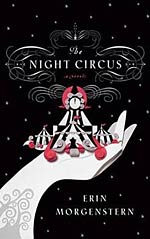
![]() SueCCCP
SueCCCP
1/1/2013
![]()
In some ways I wish I had not heard anything about this book before starting it, because the descriptions are not very accurate and give a false sense of what to expect. This is a pet peeve of mine because it distracts me from the actual book by setting up expectations that are then left unrealized: I should not read a book waiting for the things promised by the ‘blurb’ on the back cover if they never arrive.
The description of the book places a lot of emphasis on the duel between Celia and Marco, and yet the book itself seems to ignore this aspect of the plot for quite a long time. Indeed, the Circus itself is the main focus of the book from start to finish and the people who inhabit and visit the Circus are most definitely secondary in importance. Yet, we never get a good description of much of the Circus or its performers, which left me frustrated and disappointed. A good deal of time is spent showing some of the more magical attractions, but these vignettes did not really progress the story or serve much purpose apart from being cool and showing the power of the magicians. It is very obvious that Ms Morgenstern is in love with circuses, but there was far, far too much time spent drifting through ‘the wonders of the Circus’. However, perhaps the most annoying aspect of the Circus is that even with all the magic that is on display, it is all supposed to be a wondrous illusion and no one seriously questions whether or not it really IS magic.
By concentrating so closely on the Circus itself the characters were given little time or space to flourish. The protagonists are unaware of one another for much of the book and then there is a flurry of emotion and angst as they try to decide what to do about their relationship and the duel. However, the duel itself progresses with a glacial slowness as they attempt to out-magic one another. Their competition is severely hampered by them being unaware of any rules or the end point that they need to attain. They continue to create attractions at the Circus in an attempt to out perform one another, but with no apparent point scoring or benefit on either side. This takes the idea of a duel, which signifies a fight in my mind, and makes it rather dull. We learn that the previous duel lasted for thirty-seven years before one of the competitors committed suicide: presumably out of a desperation to not have their life ruled by some stupid game that they did not understand and could not hope to win.
Celia and Marco are given very little character development and many of the secondary characters are limited to the roughest sketches. Our ‘lovers’ spend a great deal of the book unaware of the other’s existence and then meet and fall in love for no apparent reason. We do see Marco falling for another woman and this was nicely done, although I was somewhat confused until I realized that this woman was NOT Celia. This poor woman joins the Circus as the fortuneteller in order to spy on Celia for Marco and is eventually driven to despair. Her actions threaten the lives of everyone involved with the Circus. I felt very sorry for her and Marco’s behavior towards her is selfish and uncaring: not good characteristics for the hero of a story. On the whole, I felt sorry for the pair because of how they had been mistreated by their trainers, but not much else.
The competing magician-trainers, who provide the impetus for the story, are cold psychopaths who are consumed by their prideful attempts to prove which of them is better as a trainer. It appears that they have conducted this contest over hundreds of years with not a single care for the magicians that they have trained or the other people who have been affected by their competition. I really did hope that they would both get some well-deserved punishment for their atrocious behavior, but I was sadly disappointed. I was also disappointed that Celia and Marco were so compliant with these monsters’ demands: we saw no resistance or rebellion, just meek acceptance. Of the other characters, I was most intrigued by the Twins, who are the only members of the Circus who age, but they are mainly included to provide Bailey with a way to reach his DESTINY, which was telegraphed from fairly early on in the book.
One other aspect that was frustrating in the extreme was the non-linear presentation of the segments. I had been warned about this before I started reading, but it still presented problems because the dates were often very close together. I realize that the reason for this was to allow for the introduction of Bailey near to the beginning of the book, but by doing this Ms Morgenstern made it very obvious what his role would be at the end of the story.
In short, the descriptions of the Circus and its wonders were excellent and evocative. However, they filled most of the book and slowed down the plot to a snail’s pace. The plot itself was uninteresting and the characters were mostly poorly drawn and therefore unlovable. I have seen many reviews from people who loved this book, but I cannot understand why.
For my complete review, click the link below:
http://coffeecookiesandchilipeppers.blogspot.com/2012/07/the-night-circus-by-erin-morgenstern.html